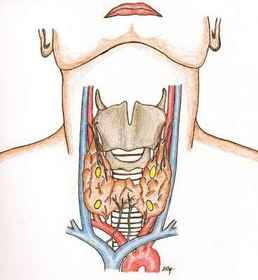Testing and diagnosis
The basic blood test is a thyroid function test (TFT), which checks the level of your thyroid hormone produced by your thyroid (free T3 and free T4) and the Thyroid-Stimulating Hormone (TSH) produced by the pituitary gland. This test will determine if you are hyper- (high) or hypo- (low) thyroid.
The ultrasonography is a simple test provides information about the features of the thyroid gland. A gel is placed on the skin to help facilitate the transmission of the sound waves, which are emitted from a small hand-held transducer. This test does not involve any radiation, is fast, and painless. Occasionally, the follow-up of a thyroid nodule may require multiple ultrasounds of the thyroid gland.
- Fine Needle Aspiration Biopsy
A small-sized needle is inserted into the nodule a few times to aspirate cells into a syringe. The cells are then placed onto a microscope slide, stained, and examined by a pathologist. The nodule is then classified as non-diagnostic, benign, suspicious, or malignant.
Treatment
Surgery
Low thyroid hormone levels are treated by thyroxin tablets with 6 monthly blood tests. Over-activity of the thyroid gland is treated with drugs that reduce the production of the thyroid hormones. If this is unable to control the thyroid hormone secretion or if the patient is unable to tolerate treatment, the entire thyroid can be removed surgically. Alternatively, the overactive thyroid cells can be killed with radioactive iodine. Your doctor will carry out a complete assessment of your pre-existing condition and your thyroid disorder before recommending the best treatment.
Surgery is recommended for thyroid nodules in some cases. Cancer is treated by surgically removing the thyroid gland. A multi-disciplinary approach to thyroid cancer management involves surgeons, endocrinologists and nuclear medicine physicians working jointly to provide holistic patient care.
A non-cancerous thyroid nodule may also require surgery, if the patient has difficulties breathing or swallowing due to the size of the nodule. Nodules diagnosed as indeterminate or suspicious by the fine needle aspiration biopsy as mentioned above, may also require surgery. Occasionally, the patient may choose to remove the nodule if it is large or unsightly.
Echotherapy
Echotherapy is a non-invasive, high intensity ultrasound which delivers energy to destroy and shrink abnormal or enlarged tissues of thyroid nodules, tumours and goitres in the neck region.
The criteria to undergo echotherapy are:
- The thyroid nodule/tumour/goitre must be benign (non-cancerous)
- The size of the thyroid nodule must be 1–4cm
- The doctor has certified/diagnosed that the patient is not fit for surgery
The benefits of echotherapy are:
- No cuts, wounds or scars
- Procedure done under sedation without the use of general anaesthesia and its associated risks
- Preservation of the thyroid gland and its function with no life-long thyroxine replacement medication
- 45 minutes – 1 hour treatment duration
- Day procedure with quick return to normal daily life
The risks include:
- Sedation-related risks
- Temporary skin redness
- Recurrence of thyroid nodules (patient can choose to undergo the same procedure again)
- Small risk of injury to nerves controlling vocal cords


















